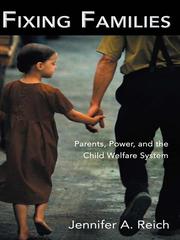| Listing 1 - 4 of 4 |
Sort by
|

ISBN: 0203619374 1283892006 1136075461 9780203955109 0203955102 9781136075469 9780203619377 041594726X 0415947278 9780415947268 9780415947275 9781136075629 1136075623 9781136075544 1136075542 Year: 2005 Publisher: London Routledge, Taylor & Francis Group
Abstract | Keywords | Export | Availability | Bookmark
 Loading...
Loading...Choose an application
- Reference Manager
- EndNote
- RefWorks (Direct export to RefWorks)
In Fixing Families, Jennifer Reich takes us inside Child Protective Services for an in-depth look at the entire organization. Following families from the beginning of a case to its discharge, Reich shows how parents negotiate with the state for custody of their children, and how being held accountable to the state affects a family.
Child welfare - United States. --- Child welfare -- United States. --- Dysfunctional families -- Services for -- United States. --- Family social work - United States. --- Family social work -- United States. --- Problem families - Services for - United States. --- Sociology of the family. Sociology of sexuality --- Sociology of social care --- Criminology. Victimology --- Family law. Inheritance law --- United States --- United States of America
Book
ISBN: 1479884502 9781479884506 9781479812790 147981279X Year: 2016 Publisher: New York, NY
Abstract | Keywords | Export | Availability | Bookmark
 Loading...
Loading...Choose an application
- Reference Manager
- EndNote
- RefWorks (Direct export to RefWorks)
Winner, 2018 Donald W. Light Award for Applied Medical Sociology, American Sociological Association Medical Sociology Section Winner, 2018 Distinguished Scholarship Award presented by the Pacific Sociology Association Honorable Mention, 2017 ESS Mirra Komarovsky Book Award presented by the Eastern Sociological Society Outstanding Book Award for the Section on Altruism, Morality, and Social Solidarity presented by the American Sociological Association A rich, multi-faceted examination into the attitudes and beliefs of parents who choose not to immunize their children The measles outbreak at Disneyland in December 2014 spread to a half-dozen U.S. states and sickened 147 people. It is just one recent incident that the medical community blames on the nation’s falling vaccination rates. Still, many parents continue to claim that the risks that vaccines pose to their children are far greater than their benefits. Given the research and the unanimity of opinion within the medical community, many ask how such parents—who are most likely to be white, college educated, and with a family income over $75,000—could hold such beliefs. For over a decade, Jennifer Reich has been studying the phenomenon of vaccine refusal from the perspectives of parents who distrust vaccines and the corporations that make them, as well as the health care providers and policy makers who see them as essential to ensuring community health. Reich reveals how parents who opt out of vaccinations see their decision: what they fear, what they hope to control, and what they believe is in their child’s best interest. Based on interviews with parents who fully reject vaccines as well as those who believe in “slow vax,” or altering the number of and time between vaccinations, the author provides a fascinating account of these parents’ points of view. Placing these stories in dialogue with those of pediatricians who see the devastation that can be caused by vaccine-preventable diseases and the policy makers who aim to create healthy communities, Calling the Shots offers a unique opportunity to understand the points of disagreement on what is best for children, communities, and public health, and the ways in which we can bridge these differences.
Vaccination of children. --- Vaccination of children --- Vaccines --- Biologicals --- Children --- Communicable diseases in children --- Immunization of children --- Complications --- Risk factors. --- Health aspects. --- Diseases --- Vaccination --- Eltern. --- Kind. --- Impfung. --- Ablehnung. --- Impfen --- Schutzimpfung --- Vakzination --- Aktive Immunisierung --- Vakzinierung --- Immunisierung --- Impfstoff --- Impfschutz --- Kindheit --- Kindesalter --- Kindschaft --- Kinder --- Lebensalter --- Elternhaus --- Elternschaft --- Verwandtschaft
Book
ISBN: 9780367027728 0367027720 9780367027766 0367027763 Year: 2021 Publisher: New York, NY Routledge Books
Abstract | Keywords | Export | Availability | Bookmark
 Loading...
Loading...Choose an application
- Reference Manager
- EndNote
- RefWorks (Direct export to RefWorks)
"The State of Families: Law, Policy, and the Meanings of Relationships collects essential readings on the family to examine the multiple forms of contemporary families, the many issues facing families, the policies that regulate families, and how families-and family life-have become politicized. This text explores various dimensions of "the family" and uses a critical approach to understand the historical, cultural, and political constructions of the family. Each section takes different aspects of the family to highlight the intersection of individual experience, structures of inequality-including, race, class, gender, sexuality, disability, and immigration-and state power. Readings, both original and reprinted from a wide range of experts in the field, show the multiple forms and meanings of family by delving into topics including the traditional ground of motherhood, childhood, and marriage, while also exploring cutting edge research into fatherhood, reproduction, child-free families, and welfare. Taking an interdisciplinary approach to the family, The State of Families offers students in the social sciences and professionals working with families new ways to identify how social structure and institutional practice shape individual experience"--
Families --- Marriage --- Parent and child
Digital
ISBN: 9781479884506 Year: 2016 Publisher: New York, N.Y. New York University Press
Abstract | Keywords | Export | Availability | Bookmark
 Loading...
Loading...Choose an application
- Reference Manager
- EndNote
- RefWorks (Direct export to RefWorks)
| Listing 1 - 4 of 4 |
Sort by
|

 Search
Search Feedback
Feedback About UniCat
About UniCat  Help
Help News
News